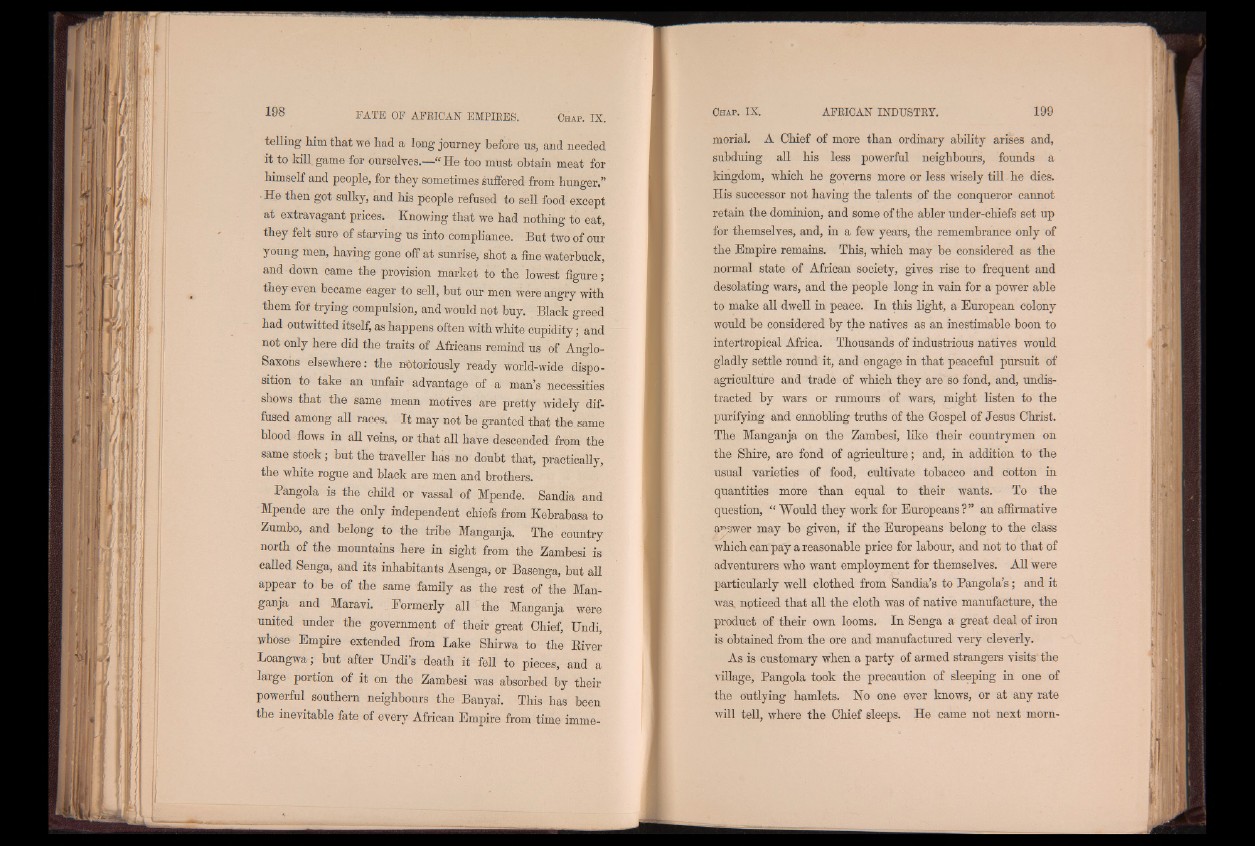
telling him that we had a long journey before us, and needed
it to kill game for ourselves.—“ He too must obtain meat for
himself and people, for they sometimes suffered from hunger.”
• He then got sulky, and his people refused to sell food except
at extravagant prices. Knowing that we had nothing to eat,
they felt sure of starving us into compliance. But two of our
young men, having gone off at sunrise, shot a fine waterbuck,
and down came the provision market to the lowest figure;
they even became eager to sell, but our men were angry with
them fof trying compulsion, and would not buy. Black greed
had outwitted itself, as happens often with white cupidity; and
not only here did the traits of Africans remind us of Anglo-
Saxons elsewhere: the notoriously ready world-wide disposition
to take an unfair advantage of a man’s necessities
shows that the same mean motives are pretty widely diffused
among all races. I t may not be granted that the same
blood flows in all veins, or that all have descended from the
same stock; but the traveller has no doubt that, practically,
the white rogue and black are men and brothers.
Pangola is the child or vassal of Mpende. Sandia and
Mpende are the only independent chiefs from Kebrabasa to
Zumbo, and belong to the tribe Manganja. The country
north of the mountains here in sight from the Zambesi is
called Senga, and its inhabitants Asenga, or Basenga, but all
appear to be of the same family as the rest of the Manganja
and Maravi. Formerly all the Manganja were
united under the government of their great Chief, TJndi,
whose Empire extended from Lake Shirwa to the River
Loangwa; but after Undi’s death it fell to pieces, and a
large portion of it on the Zambesi was absorbed by their
powerful southern neighbours the Banyai. This has been
the inevitable fate of every African Empire from time immemorial.
A Chief of more than ordinary ability arises and,
subduing all his less powerful neighbours, founds a
kingdom, which he governs more or less wisely till he dies.
His successor not having the talents of the conqueror cannot
retain the dominion, and some of the abler under-chiefs set up
for themselves, and, in a few years, the remembrance only of
the Empire remains. This, which may be considered as the
normal state of African society, gives rise to frequent and
desolating wars, and the people long in vain for a power able
to make all dwell in peace. In this light, a European colony
would be considered by the natives as an inestimable boon to
intertropical Africa. Thousands of industrious natives would
gladly settle round' it, and engage in that peaceful pursuit of
agriculture and trade of which they are so fond, and, undistracted
by wars or rumours of wars, might listen to the
purifying and ennobling truths of the Gospel of Jesus Christ.
The Manganja on the Zambesi, like their countrymen on
the Shire, are fond of agriculture; and, in addition to the
usual varieties of food, cultivate tobacco and cotton in
quantities more than equal to their wants. To the
question, “ Would they work for Europeans?” an affirmative
aT’íswer may be given, if the Europeans belong to the class
which can pay a reasonable price for labour, and not to that of
adventurers who want employment for themselves. All were
particularly well clothed from Sandia’s to Pangola’s ; and it
was, npticed that all the cloth was of native manufacture, the
product of their own looms. In Senga a great deal of iron
is obtained from the ore and manufactured very cleverly.
As is customary when a party of armed strangers visits the
village, Pangola took the precaution of sleeping in one of
the outlying hamlets. No one ever knows, or at any rate
will tell, where the Chief sleeps. He came not next morn